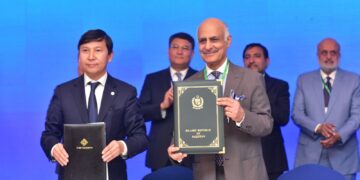President SAARC Chamber of Commerce and Industry Iftikhar Ali Malik Monday cautioned that escalating Russia-Ukraine war will have adverse economic impact on South Asian countries.
Talking to a delegation of traders led by Momin Ali Malik,member executive committee Lahore Chamber, he said the 2022 outlook for the global economy now seems bleak and South Asia will also be affected.
Octogenarian trade leader said Russia and Ukraine combined have a significant share of global supplies of oil, gas and other commodities, so the invasion has increased commodity prices.The direct impact on South Asia will mainly occur through trade linkages, particularly through rising commodity prices as the region is a net importer of commodities.He said even before the invasion, inflation in South Asian economies was rising relative to competitors in global markets. The additional shock in commodity prices will further widen the gap — increasing the relative cost of production in the region — and erode the competitiveness of cheap labour and energy-intensive industries he added. He said reliance on fossil fuels for energy generation is higher in South Asia than elsewhere in Asia.
Iftikhar Ali Malik said the direct impact will immediately result into higher inflation while the indirect impact will face lower economic growth leading to stagflation and the extent of the economic hit on South Asia will depend on the duration of the conflict, the severity of Western sanctions on Russia and Russian response. He said South Asian countries will vary depending on their economic linkages with Russia and Ukraine, and the growth and financial market linkages to the rest of the world.
He is of the view that tough Western sanctions against Russia for a longer period will cause a persistent rise in commodity prices and global inflation. This would have adverse implications on global growth leading to lower external demand for South Asian exports he added. He said Inflation in South Asia rose in the aftermath of the pandemic, increasing income inequalities and pushing more people into poverty.
Iftikhar Ali Malik said a sustained conflict could have a more lasting and more drastic effect on South Asia and feared that the situation may deteriorate further as Russia is putting its nuclear forces on high alert. The economic fallout for South Asia from the worst-case scenario would be more adverse than the total economic impact of pandemic.
He said bleak economies, which are more vulnerable to external shocks — Bhutan, Nepal, Maldives and Sri Lanka — could bear the brunt of larger shorter-term growth contractions than India and Bangladesh. Pakistan’s economy, suffering from multiple vulnerabilities, is also likely to contract. Tourism and trade linkages will take a hit in smaller countries.
He said India can minimise the growth impact through domestic demand management policies using available monetary and fiscal policy. Other South Asian countries will be forced to absorb the shocks of lower external demand and volatile financial market conditions through economic contraction, leading more people to fall below the poverty line he concluded.

















